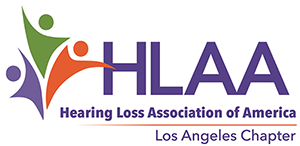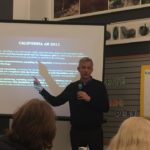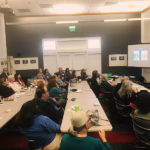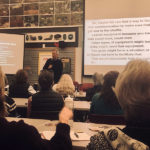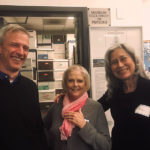March Meeting Recap: From Earthquakes to Birthday Cake! Part 1
We had another packed house on Saturday at our March 23rd chapter meeting, with many known and new faces. Attendees were captivated by our topic—“Emergency Preparedness for the Hard of Hearing,” presented by Rick Pope, who serves as the ADA Coordinator/ASL Interpreter for the City of Los Angeles. And before the meeting ended, everyone got a chance to celebrate an amazing lady for a very special milestone.
Introduced by our chapter President Jenna Nelson, Rick generously shared a wealth of knowledge about preparing for disasters like earthquakes and wildfires based on his experience working with first responders on the ground for various incidents, his involvement in planning for the deployment of interpreters in emergency/disaster situations, and training of people to ensure accessibility in shelters.
You can view the meeting transcript here, but a few of Rick’s key points and recommended resources are summarized in this post:
- Rick began by describing the 2016 California Assembly Bill 2311 amendment to the Government Emergency Code for communications, accessibility accommodations and ADA compliance in emergency situations, including assistive technology for the hard of hearing, by cities and counties.
- NotifyLA is the City’s official mass notification system used to send voice messages, texts, and email alerts to residents and businesses during times of emergencies and disasters. Hard-of-hearing individuals who rely on Relay Services are encouraged to provide a mobile number to receive text messages. Sign up for NotifyLA.
- The new ShakeAlert LA smartphone app provides early warning of significant earthquake activity and follow-up support. Download the ShakeAlert LA app.
- Thanks to AB 1168, Text-to-911 services are now operational for mobile phones in Los Angeles, Sacramento and San Mateo Counties. “Call 911 if you can, TEXT if you can’t.”
- Despite the prevalence of mobile and VOIP phones, Rick stressed the critical importance of keeping (or getting) an old-fashioned analog landline telephone connected at your home, since that is currently the ONLY way for emergency dispatchers to automatically receive your location through their system. You should be able to request a special emergency-only rate from your local phone provider.
- The City has developed a program called Ready Your LA Neighborhood (RYLAN) to help your family and your neighborhood prepare for disasters.
- Consider getting trained to join your local Community Emergency Response Team (CERT).
- Rick highly recommended finding your closest local Fire and Police Stations, visiting them personally, and introducing yourself to the staff as a constituent with hearing loss. Provide your name, address, and contact information, so they can locate you in disaster or fire, even if you are unable to hear announcements, such as evacuation orders.
- You should also have a strong Personal Preparedness Contingency Plan, which includes an evacuation strategy and survival items for your family.
- If you end up evacuated to an emergency shelter, be sure to notify personnel that you need accommodations like captioning or instructions written on a white board, as you will likely have difficulty hearing shouted announcements in that chaotic environment.
- Rick also suggested ways that our chapter of HLAA could prepare for emergencies and also be of support to individuals with hearing loss who have been affected.
Part 2 of the meeting will be posted to the site shortly with much more chapter news, announcements, and a special celebration to share! Stay tuned!
- Packed house to learn about emergency preparedness.
- Rick presenting.
- Plenty of Q&A and thanks after his presentation.
